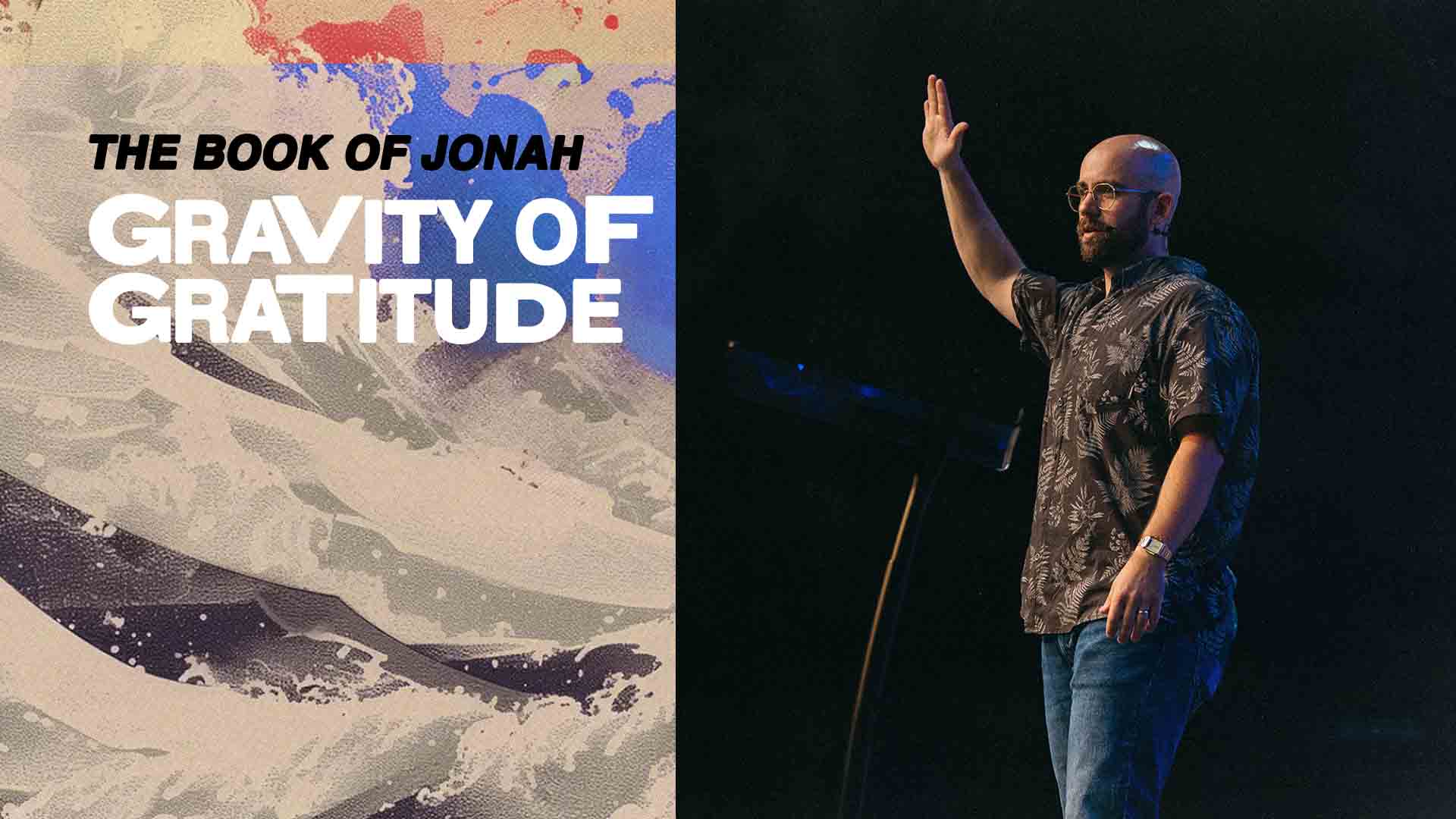
The Book of Jonah | Week 2
The Book of Jonah | Taylor Thompson | “Gravity of Gratitude”
Bible Passages/Key Points:
“Gravity Of Gratitude”
Gravity of Gratitude…
1 Thessalonians 5:16-18 – 16Rejoice always, 17pray continually, 18give thanks in all circumstances; for this is God’s will for you in Christ Jesus.
Jonah 1:17 – 17Now the Lord provided a huge fish to swallow Jonah, and Jonah was in the belly of the fish three days and three nights.
(POINT ONE) Overcomes our circumstances
Jonah 2:1-2 – 1From inside the fish Jonah prayed to the Lord his God. 2He said: “In my distress I called to the Lord, and he answered me. From deep in the realm of the dead I called for help, and you listened to my cry.
Philippians 4:8 – 8Finally, brothers and sisters, whatever is true, whatever is noble, whatever is right, whatever is pure, whatever is lovely, whatever is admirable—if anything is excellent or praiseworthy—think about such things.
Jonah 2:9-10 – What I have vowed I will make good. I will say, ‘Salvation comes from the Lord.’ ” 10And the Lord commanded the fish, and it vomited Jonah onto dry land.
(POINT TWO) Affects our effort
Jonah 3:3-4 – 3Jonah obeyed the word of the Lord and went to Nineveh. Now Nineveh was a very large city; it took three days to go through it. 4Jonah began by going a day’s journey into the city, proclaiming, “Forty more days and Nineveh will be overthrown.”
Jonah 4:5 – 5Jonah had gone out and sat down at a place east of the city. There he made himself a shelter, sat in its shade and waited to see what would happen to the city.
Jonah 4:1-3 – 1But to Jonah this seemed very wrong, and he became angry. 2He prayed to the Lord, “Isn’t this what I said, Lord, when I was still at home? That is what I tried to forestall by fleeing to Tarshish. I knew that you are a gracious and compassionate God, slow to anger and abounding in love, a God who relents from sending calamity. 3Now, Lord, take away my life, for it is better for me to die than to live.”
(POINT THREE) Allows God to guide you
Jeremiah 17:9 – 9The heart is deceitful above all things and beyond cure. Who can understand it?
Jonah 4:4 – 4But the Lord replied, “Is it right for you to be angry?”
Jonah 4:9-11 – 9But God said to Jonah, “Is it right for you to be angry about the plant?” “It is,” he said. “And I’m so angry I wish I were dead.” 10But the Lord said, “You have been concerned about this plant, though you did not tend it or make it grow. It sprang up overnight and died overnight. 11And should I not have concern for the great city of Nineveh, in which there are more than a hundred and twenty thousand people who cannot tell their right hand from their left—and also many animals?”
Key Points:
- Summarize the main points or key messages of the sermon.
- Highlight any memorable quotes or phrases from the sermon.
Scriptural Foundation:
- Discuss the Bible passage(s) that were the basis of the sermon.
- Explore the context and significance of the chosen scripture.
Personal Reflection:
- Share your personal thoughts and feelings about the sermon.
- How did the sermon impact you? What resonated with you?
- Were there any moments of conviction, inspiration, or clarity?
Discussion Questions:
List a set of open-ended questions to facilitate discussion. These questions can help attendees engage with the sermon’s content on a deeper level.
Example questions:
1. What do you think the Taylor’s main message or takeaway was from the sermon?
2. How does the scripture relate to the sermon’s message?
3. Were there any practical applications or actionable insights that stood out to you?
4. Did the sermon challenge any of your beliefs or perspectives?
5. How can we apply the sermon’s teachings in our daily lives?
Group Sharing:
- Encourage participants to share their thoughts, questions, or personal experiences related to the sermon.
- Create an open and respectful environment for discussion.
Additional Resources:
- Provide information about any recommended books, articles, or further readings related to the sermon’s topic.
- Mention upcoming events or opportunities for Group members to explore the sermon’s theme further.
Conclusion:
- Summarize the key takeaways from the discussion.
- Emphasize the importance of applying the sermon’s teachings in daily life.
- Announce any follow-up actions or future discussions related to the sermon.
Closing Prayer:
- Take the time to ask members of the Group if they have any prayer requests.
- Conclude the discussion with a brief prayer, asking for guidance and wisdom in applying the sermon’s message to be on mission.